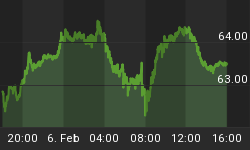The old adage of what is good for Wall Street is not good for Main Street can easily be applied to the policy of quantitative easing (QE). As the markets approach another QE moment, the debate rages on about the benefits (or lack there of) of implementing a policy that has shown little long term benefit. After 2 QE's and an Operation Twist, the economy is still struggling to gain traction, and in many respects, looks ready to rollover. Of course, Wall Street doesn't care about Main Street, and in some ways, the worse off Main Street is, the better for Wall Street as it is easier to make the case for some more monetary morphine (QE).
As shown in yesterday's article, the Fed has shown up to rescue the economy and markets in 201o and 2011 when it appeared that the economy and markets were ready to rollover. Here in 2012, we find ourselves at a similar juncture. This can be seen in figure 1, which is a weekly chart of the SP500 with the Economic Cycle Research Institute's (ECRI) Weekly Leading Growth Index (WLI) in the lower panel. The current value of the WLI is -2. Values less than -2.4 have been consistently linked to recessions. Values of WLI < -2.4 are noted by the red labeled price bars. As you can see, QE2 and Operation Twist were announced and implemented when the WLI was in recession territory. (These are the dashed vertical lines.)
Figure 1. SP500/ weekly
![]() Larger Image
Larger Image
I last mentioned the WLI in this article on April 30, 2012, when I noticed that the WLI was rolling over, and prior instances of the indicator rolling over in 2009 and 2011 (following QE1 and QE2) were noteworthy as gains in the market also petered out at that time. (See the pink vertical lines in figure 1 for times when the WLI rolled over.) It would seem logical to infer that each episode of QE has prevented (or delayed) a full blown recession. The WLI was indicating recession, and it was the actions of the Federal Reserve that thwarted the downward trajectory of the economy. But what should be clear is that each jolt of monetary stimulus has produced less of an effect. For example, QE 1 produced more economic activity than QE2, which was better than QE3 (i.e., Operation Twist). This can be seen by the lower highs in the WLI.
So while Wall Street craves for monetary morphine and investors position themselves for the "Bernanke put", Main Street sinks into a recession. The lasting benefit of QE remains in doubt.















